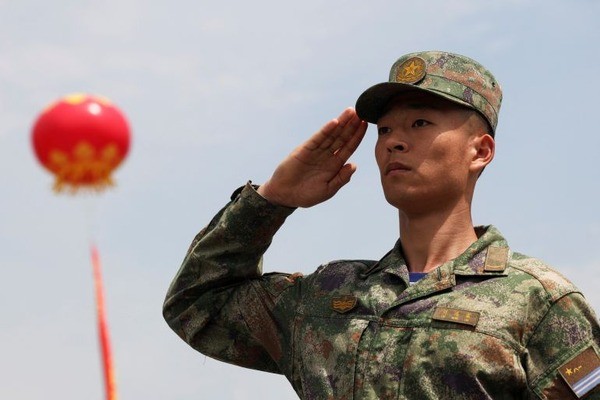Iran’s Plan to Strike Back Against the U.S.
Iran’s Military Preparations Following U.S. Attacks
Loading...

The drills commence three days following William Lai Ching-te's inauguration as president of the island contested by China.
According to Chinese state media, two days of military exercises have commenced in the maritime and aerial domains surrounding the autonomous island of Taiwan. The state-controlled Xinhua news agency reported that the Eastern Theatre Command of the People’s Liberation Army initiated the drills at 7:45 am (23:45 GMT) on Thursday in the Taiwan Strait, as well as the northern, southern, and eastern regions of Taiwan, along with the vicinity of the Kinmen, Matsu, Wuqiu, and Dongyin islands.
According to a post on China's Weibo messaging platform, Colonel Li Xi, a military spokesperson, stated that the joint exercises, which involve the army, navy, air force, and rocket force, serve as a "firm response to the separatist actions of 'Taiwan independence' forces and a clear warning against interference and provocation by external entities."
Dubbed Joint Sword-2024A, the demonstration of strength follows three days after Taiwan's new president, William Lai Ching-te, was sworn into office and urged Beijing to cease its "intimidation" of the island, claimed by China as its territory.
Beijing, not ruling out the use of force for reunification, reacted strongly to Lai's inauguration, labeling him a "troublemaker" and a "separatist."
Taiwan's Ministry of Defence declared a state of "high alert" in response to China's maneuvers, denouncing them as "irrational provocations" that disrupt regional peace and stability.
In response to the start of the exercises, Lai Ching-te affirmed his commitment to defending the values of freedom and democracy against "external" challenges and threats, underscoring his responsibility as Commander in Chief to safeguard the country.
A spokesperson for Australian Foreign Minister Penny Wong expressed concern about China's military activities, warning of the heightened risk of accidents or escalated tensions.
"The risk of accidents and potential escalation is mounting," the spokesperson cautioned. "Preserving peace and stability in the Taiwan Strait is in the interest of all parties involved."
Bonnie Glaser, managing director of the Indo-Pacific program at the German Marshall Fund of the United States, observed that Beijing's reaction to Lai's election victory in January had been relatively restrained.
"The People's Republic of China evidently opted to await his inaugural address before determining their response," she told Al Jazeera, using the initials of China's formal name.
"It's apparent that Beijing strongly opposes what they perceive as an effort to construct a comprehensive 'Taiwan independence' narrative aimed at reshaping the dynamics of cross-strait relations. I anticipate that they will introduce a series of military, political, and economic measures in the coming weeks and months."
In his inaugural address to the public, Lai asserted that "the Republic of China, Taiwan, is a sovereign and independent nation, with sovereignty vested in its people," emphasizing his government's unwavering commitment to democracy and freedoms, with no room for compromise.
He urged Beijing to "cease its aggressive stance towards Taiwan" and work towards "upholding peace and stability in the Taiwan Strait and the broader region."
The following day, Chinese Foreign Minister Wang Yi strongly condemned Lai's statements. "The reprehensible actions of Lai Ching-te and others who betray their nation and ancestors are shameful," quoted China's Ministry of Foreign Affairs during a meeting of foreign ministers of the Shanghai Cooperation Organization in Kazakhstan.
Wang Yi asserted that nothing would hinder China's pursuit of "reunification" and the return of Taiwan to the mainland, warning that all advocates of Taiwanese independence would face historical condemnation.
In an editorial published on Wednesday, the state-owned Global Times labeled Lai's inaugural address as "despicable conduct," accusing him of delivering a speech rife with hostility, provocation, falsehoods, and deceit.
China has stepped up military activities around the island ever since Tsai Ing-wen, Lai’s predecessor and also a member of the Democratic Progressive Party (DPP), was elected for her first term as president in 2016. It has often taken more aggressive measures when Taiwan officials meet politicians from the United States, a key Taiwan ally, and conducted unprecedented series of war games after then US House Speaker Nancy Pelosi visited the island in August 2022.
Taiwan’s ministry of defence said such actions had caused “substantial harm to global peace and stability”.
It added that the latest military exercises were being carried out “under false pretenses” and highlighted China’s “hegemonic nature”.
Wen-ti Sung, a specialist in Taiwan and China and a non-resident fellow at the Atlantic Council’s Global China Hub, said there could be more to come.
“This round of military drills is code-named ‘Joint Sword-2024A’,” he noted. “The suffix ‘A’ suggests there may be future rounds B, and possibly C. Beijing is showing muscle in the immediate wake of Lai’s presidential inauguration to unmistakably signal Beijing’s displeasure. But this is the ‘signal’. The real ‘punishment’ is yet to come.”
China sees the DPP as “separatists” bent on independence. Tsai and Lai, whose victory marked an historic third term for the DPP, say the people of Taiwan should be the ones to choose their future.
Iran’s Military Preparations Following U.S. Attacks
Troops remain in five strategic locations, raising fears of renewed tensions and long-term occupation.
Opposition forces have taken control of the capital after a significant offensive. Here is how it unravelled.
